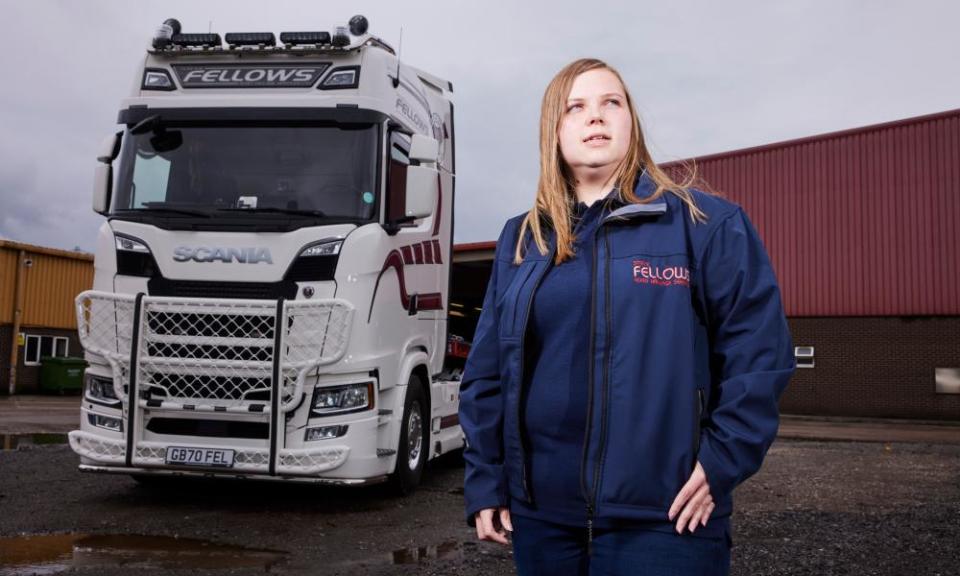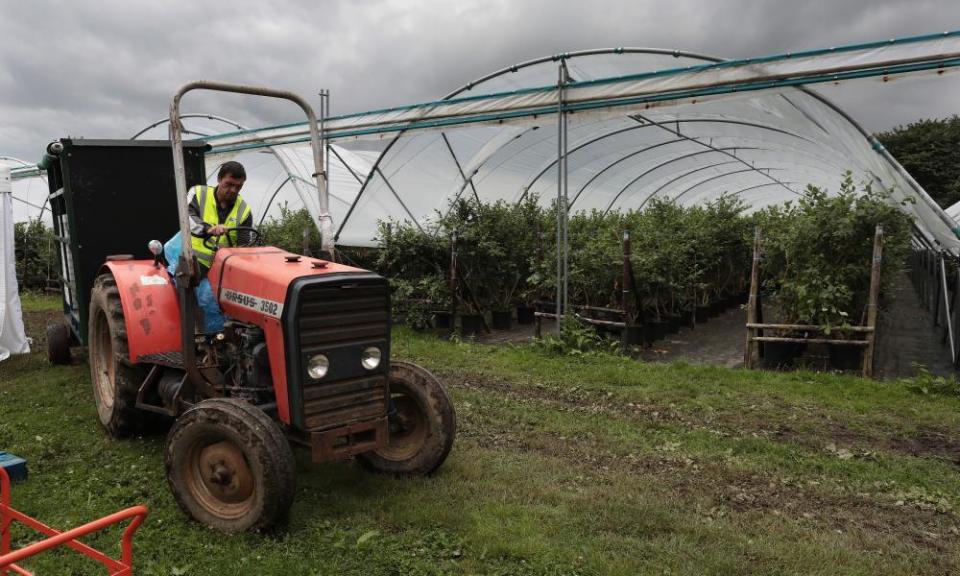‘We’re all in the same boat’: employers on worker shortages in England

Employers across the UK are struggling to hire enough staff as Covid restrictions ease amid nationwide worker shortages. However, some sectors are finding it tougher than others.
Figures from the jobs websites Adzuna and Indeed show warehousing and transport, care, hospitality, manufacturing, and food preparation and service are among the sectors facing the biggest hiring challenges. Three employers discuss the issues they are facing.
Transport: Steve Fellows Road Haulage
Laura Salt, haulage operations manager
There is plenty of demand for the services of the medium-sized business Laura Salt manages in Burton, Derbyshire – the problem is finding the staff. “We could put a lot more trucks on the road tomorrow if we had the drivers,” she says. “Sometimes, we have three or four lorries stood with our drivers on days off and we can’t get anyone in to cover them.”
Salt’s employer, Steve Fellows Road Haulage, works for a major supermarket. Its 14 lorries and 16 drivers help dispatch chilled and frozen goods from a giant Midlands distribution hub to local “spokes” for home delivery.
But the shortage of drivers, she says, has led to the previously unthinkable. “Recently we’ve been having to say that we can’t cover the runs, can’t make the delivery. Before, it would never have happened.”
Their client at least fully understands the situation, she says: “They know if we can’t cover it, we’ve done our best to try – everyone’s in the same boat as us.”

Brexit and Covid have worsened driver shortages across the industry, according to the Road Haulage Association. For her firm, Salt says: “It was getting harder before the first lockdown, and is getting worse and worse. We lost three drivers due to Brexit – Spanish, Czech, Portuguese – who had been with us for years.”
New customs and travel rules have exacerbated the pressure on staff rotas, with four of the drivers working internationally. “Where a job used to turn around in five days, it’s now becoming over a week. You never know how long it’s going to take to clear customs … The record is five days.”
She isn’t impressed by proposals from the transport secretary, Grant Shapps, to extend drivers’ hours to tackle the shortage. “They work hard enough as it is, up to a 15-hour day, so extending their hours won’t solve it. They’re only human.”
Despite substantial cost increases, the firm has raised its pay: “We have had to increase our wages, just so we don’t lose the crew we’ve got.” Enticing drivers also means jazzing up the vehicles: “The first thing most people ask at interview is what kind of truck I’ll be driving. They want light bars [spotlights] and things – we haven’t got any fleet-spec trucks, it’s all added extras. Pimp my truck!”
If consumers are only just noticing the driver shortage, Salt warns it will get worse: “It’s going to have a massive effect on getting food on the shelves. Christmas is when it’s really going to hit, when orders go up drastically.”
Which products are likely to be affected? “Everything. If people haven’t got the drivers, they can’t make the deliveries – it’s everything.”
Agriculture: Winterwood Farms
Sharon White, harvest manager
Blueberry picking is finally under way at Winterwood Farms near Maidstone in Kent after a late start due to cold and wet weather, but the 23-hectare farm needs more workers to harvest the fruit, along with raspberries and red currants, this summer.
“We had 28 workers today and could do with 20 more people; we had 21 drop out in the last 14 days,” says Sharon White, in charge of recruitment and worker welfare. About half of them, from Slovakia and Bulgaria, have applied for pre-settled status in the UK but have not had it confirmed yet, and are too nervous about their status to pay for a flight and Covid tests to come over. The government is struggling with a huge backlog of unprocessed applications.

Working at the farm, Ivan Delchev, 22, from Bulgaria, who has pre-settled status, says “it’s harder to come” because the cost of flights and food has gone up as a result of the Covid crisis and Brexit. He is one of the fastest pickers and earned £13.56 an hour on the first harvest day – but is not sure if he will be back next year, as he wants to look for a permanent job in Bulgaria once he has finished his studies in computer design.
Fruit pickers are paid at least the national minimum wage and get extra if they beat their target; the best earn more than £100 a day – much more than many East Europeans would at home. But since the Brexit vote in 2016, the numbers of seasonal workers coming to Britain for the summer months have diminished.
The soft fruit industry, which needs at least 70,000 seasonal workers every summer, is 5,000 pickers short this year, says Nicholas Marston, the chairman of British Summer Fruits. The government raised the number of temporary work (T5) visas to 30,000 this year from 10,000 in 2020, and there are a further 30,000 “returnees” from eastern Europe, who have settled status in the UK.
However, Stephen Taylor, Winterwood’s managing director, says the T5 visa scheme is “a complete balls-up”, partly as workers cannot move between farms, and partly as government did not process the visas in time for people to arrange their travel.
“There’s one other grower who has got 20 people on T5 visas and would let us have them for all of July, during a lull in their production, but we can’t employ them. They will just be sitting in a caravan.”
Hospitality: The Stafford Collection
Stuart Procter, chief operating officer
With tourists staying away and business travel down, London hotels are only welcoming a fifth of the guests they had two years ago, but it’s proving as hard to find staff as customers.
The Stafford Collection, which includes the Stafford hotel and Norma restaurant in London and the Northcote hotel in Lancashire, is looking for 50 staff on top of about 200 currently employed.

Stuart Procter, the chief operating officer, says he would normally have 500 staff, but has cut back as its London hotel has seen occupancy rates dive to just 20% during the pandemic.
The problems have been exacerbated by staff needing to self-isolate because of either catching Covid or being alerted by the NHS test and trace app. The group’s entire sales and marketing team was off for over a week recently and a receptionist also missed work.
Procter says he has kept the business trading by moving staff around, with management stepping into customer-facing roles if required. “Everyone has come together as a team,” he says.
But he warns: “Once business levels lift, especially in the London hotels, we are all going to have a significant problem.”
He says there is a particular problem with finding kitchen staff and chefs, but the group is also trying to hire housekeepers, bar staff and receptionists.
“A lot of chefs [across the industry] were put on furlough and have found other jobs with more social hours that don’t require them to work on the weekend and with less pressure for similar pay, but the biggest problem is the visa issue.”
About 80% of the Stafford group’s workers come from Europe, and during the pandemic many returned home to Spain, Italy or elsewhere to stay with family.
Many of those workers have either found themselves unable to return, after Brexit ended freedom of movement, or have been unwilling to come to the UK because of Covid or fears that hospitality businesses will face further restrictions to control the virus.
“The uncertainty due to the way hospitality has been treated [by the UK government] means it’s a worry for them to come back, as who’s to say the government won’t lock us down again tomorrow?” says Procter.

 Yahoo Finance
Yahoo Finance 